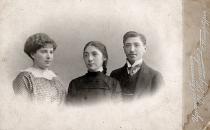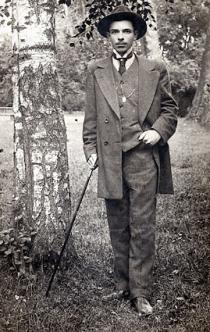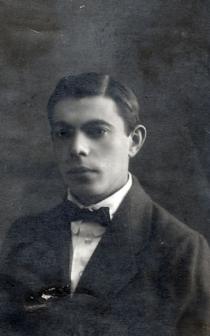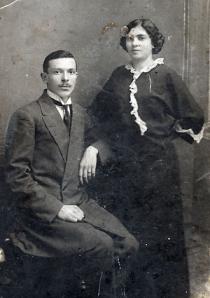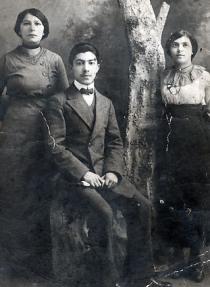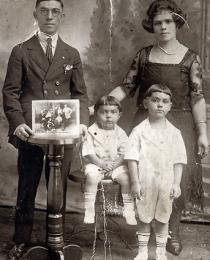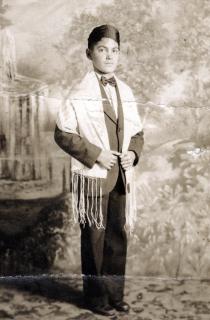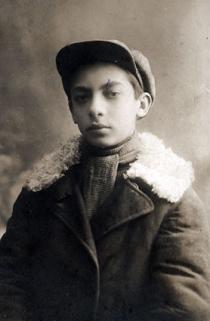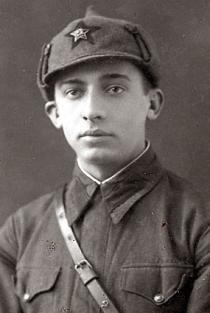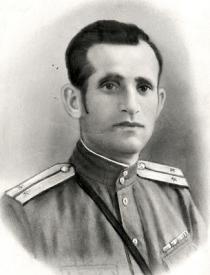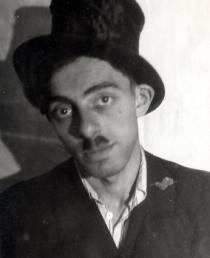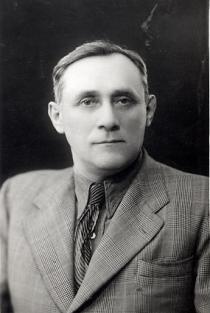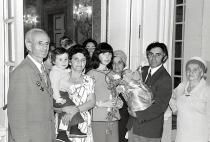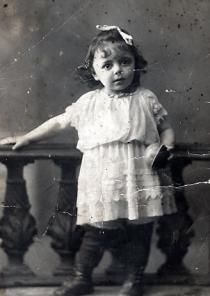
Lyudmila Kreslova
St. Petersburg
Russia
Interviewer: Inna Gimila
Date of interview: July 2002
Lyudmila Kreslova is a fragile woman with very big gray eyes and an expressive face. Her hair is short, soft and wavy, with a beautiful streak of gray color. In the course of the interview she gesticulates in an animated way, helping herself to recall some details of the past. She emotionally describes stirring events, at some moments tears sparkle in her eyes, but she doesn’t allow herself to cry, she just picks at a handkerchief she holds in her hands. Very often she acts the events out, using direct speech. Her speech is very fast and abrupt; the narration was rather confused, but very interesting. Lyudmila answered all my detailed questions with great patience.
My family background
My name according to my passport is Lyudmila Anatolievna Kreslova 1. My Jewish name, given to me by my parents, is Leya. My maiden name is Khotianova. I was born in 1921 in Vitebsk [today Belarus]. Our family lived in Vitebsk. It was a small but very beautiful and ancient town on the bank of the Western Dvina River. Houses were two-storey and three-storey, mostly built of stone.
My paternal grandfather, Borukh [Boris] Khotianov, was a cantor. He sang in the synagogue, where the town Jews gathered. He had a very good voice, they said it was unique. Grandfather wore payes and a huge beard. I don’t remember him at all.
Grandmother Khotianova died in 1896, long before I was born. Her small children were left with Grandfather. There were five of them: the eldest brother Lev [Lyova]; sisters Frida [Nina] born in 1886 and Riva; my father Navtoliy [Anatoliy], he was the fourth to be born; and another brother, whose name I don’t remember, I think it was David. When Grandmother died, Frida was ten years old, and my father was five. I don’t know the age of the other children. Grandfather didn’t want to marry again. He wasn’t able to raise the children himself and gave them away to various families in order to teach them crafts. He sent Lyova to a shoemaker, who made the upper parts for shoes; Frida found herself in the family of a seamstress and my father was given to a tailor’s family. I don’t know where the other children were raised. Grandfather left Vitebsk.
Later Father tried to find Grandfather. He found out that he left for Harbin [town in Manchuria, in the North-Eastern part of China, where a lot of emigrants from Russia lived, who maintained the Chinese-Eastern railroad]. He must have left for the place in order to earn money. Besides, there was a synagogue there. But Grandfather vanished in Harbin. Father received a reply to his inquiry, stating that Boris Khotianov had been run over by a car at the beginning of the 1930s. He was buried in Harbin.
Uncle Lyova served in the Tsar’s Army during World War I and in 1916 he was taken prisoner by the Germans. The Germans treated him very well. Thus, when we were evacuated from Vitebsk in 1941, he told Father, ‘I can speak German, I have been in German captivity, I won’t go with you, I want to stay.’ So he stayed with his family and of course they all perished. His wife Rosa perished too. They had very beautiful children: daughter Ida – the eldest, daughter Zina and son Daniil. When the war broke out, Daniil was ten years old. Ida had snow-white marble-like skin. She was born in 1924. We were neighbors with this family, our house was near theirs. We were coevals, played with them and went to the same school. It’s a pity there are no pictures of them. Uncle Lev worked as a shoe supplier at the shoe factory in Vitebsk, I forgot its name. Rosa was a Jewess and worked as a pharmacist in a drugstore. Lev and Rosa with their two daughters were buried alive not far from Vitebsk together with all the Jews, who were driven to that terrifying place.
We don’t know anything about Daniil, he disappeared without a trace. We don’t know if he managed to escape or perished. We had a neighbor, she was Polish, her name was Vera Tamulevich. She wrote me a letter after the war, in the 1960s, when I was looking for some of my friends from Vitebsk, who had survived. She wrote that she didn’t know anything about Daniil, but she doubted that he had perished. Vera asked me not to write to her after some letters. She wrote, ‘Don’t write to me, I get very upset and nervous, when I recall everything!’ The Germans didn’t touch the Poles in Vitebsk, but I know nothing about other Poles in other areas. She was lucky to be a Pole, she survived. It seems to me she lost her mind a little bit after the war. Of course, she saw such things! I could judge by her letters; I threw all her old letters away. Can you imagine, if you collect all your old stuff at home, you would have so much trash! She was a partisan during the war, near Vitebsk. When the war ended, she was given an apartment and she worked at the district Executive Committee 2, I think, as an accountant, I don’t remember exactly. She got married and had a child, but he had problems with his health.
My father Navtoliy and Uncle Lyova observed traditions. Neither their parents, nor they were interested in politics. They wore tzitzit under their clothes. It was passed to them from Grandfather.
Aunt Frida worked as a seamstress in Vitebsk and later left for Petersburg for further study. She was very beautiful. At a ball she got acquainted with the son of Putilov, the owner of Putilovskiy Plant [a large machine works in St. Petersburg, renamed to Kirovskiy Plant in 1934]. Putilov’s son fell in love with her, but he couldn’t marry a Jewess. She converted to Christianity and was baptized with the new name of Nina. Frida was baptized but remained a Jewess in her soul. He concluded a marriage contract with her for 20 years. They got married in a church. She lived with her husband on Bolshoy Prospect at Petrogradskaia Storona. They had no children.
All this happened before the Revolution 3. When the Revolution of 1917 started, Putilov’s son went abroad together with his father. Frida didn’t want to leave. She stayed after the Revolution. She told me that she loved Russia very much. However, deep in her soul she remained faithful to the Jewry. To be more precise, she had a Jewish soul. She never went abroad. I had a feeling that she was very beautiful, but not very clever. [A church marriage was indissoluble in Russia. The presence of a contract testifies for a common-law marriage, which was unofficial and was deemed as mere cohabitation.] Later Frida married for the second time. Her second husband was also from a good Russian family, some prince, but he was a real drunkard. I don’t remember his name. He stayed in Russia after the Revolution because he loved his motherland. Once, Frida came to Vitebsk to visit us, when I was small.
When the war broke out 4, Frida survived the siege of Leningrad 5. Their house was destroyed by bombing. She was evacuated with her husband to Vyshniy Volochok [a small town in Tver region, between St. Petersburg and Moscow]. Her husband died in Vyshniy Volochok. We were in evacuation in Bashkiria [today called Bashkortostan] at that time. Mother wanted to come home to Vitebsk from Bashkiria, but she didn’t get a permit 6. We obtained passes only to Vyshniy Volochok. So we went to Frida. She had one room, but she took all of us in, though my mother’s sister Nina came with two children, a boy and a girl. When we arrived, everybody went to the Russian bath to wash themselves. Then we came back to her house. I stood in front of a large mirror combing my hair. She told my mother, ‘Look, a tailor’s daughter is combing her hair in front of a mirror.’ Mother replied, ‘Certainly, the tailor is your brother.’ She was confused. She was a kind woman, but considered herself a metropolitan lady as compared to us, provincials. Frida died in 1959 in Vyshniy Volochok. She had no children.
Father’s sister Riva was older than my father. She was born in 1888. Riva was very serious. She left Vitebsk for Moscow, studied at university and obtained an education. She married an English Jew in Moscow. He was a socialist revolutionary. The younger brother of Riva and my father, who was also a revolutionary, introduced them to each other. Together with Riva’s husband-to-be they hid from the police, who wanted to arrest them. Riva lived in Moscow at that time and helped them. Riva had a daughter from this Englishman. The daughter was older than me, she perished in Moscow during the war, in the course of the bombing. During the war Riva remained in Moscow with her husband. After the war we lost contact with them. I know her English husband only from pictures.
I know very little about my father’s younger brother, whose name I don’t remember. He was very attracted by revolutionary ideas when he was young. Then he left for Moscow and studied at university, but joined a revolutionary organization. He always carried a gun and hid from police. He married a Jewess, who was also a revolutionary. He was 20 years old when he married that woman. She was much older than him. She had a 20-year-old son, his coeval. They both studied at university in Moscow, he and her son. Father’s younger brother died at a very early age. The ‘revolutionary’ brother and Riva, who married an English Jew, weren’t religious. Father loved his ‘revolutionary’ brother and Riva, but he didn’t approve of their activity. They didn’t meet and didn’t visit each other. But Father always said that they have the right to live as they want. He loved them all very much.
I remember my maternal grandparents, Mendel Kurnov and Esther Kurnova. Grandmother was a tall woman and Grandfather was short, he hardly reached her armpit, he was actually my height. Esther and Mendel were promised to each other in their youth, when they lived in their native shtetls. They had a lot of children: four daughters and three sons. They lived in Vitebsk, in the same street as we did, just next door. They were very religious. Grandfather wore a beard and Grandmother wore a shoulder-length wig. They always had kosher food. Grandmother went to the shochet to slaughter chicken and bought only kosher meat.
Grandfather Mendel was born in 1864 in Vitebsk province, in a village not far from Vitebsk. He was six years older than Grandmother. I visited them in their apartment every week. He obviously liked me, though he didn’t make much of me, didn’t tell me stories and never expressed any special tenderness. I was very small and I don’t really remember how often he prayed. Grandfather Mendel was very neat, very clean and wore only good clothes. He had a taste for clothes, as he was a tailor and he was an expert in it. They lived well, they were neither poor nor rich. Grandfather never smoked, but liked to drink: vodka, wine, but not too much. He certainly drank on holidays, both Jewish and Soviet. Since there were many holidays, it turned out that he drank often. At dinner he liked to pour himself a small glass of alcohol. Grandmother scolded him for that, but he replied, ‘I drink because of my nerves!’ Mendel had suffered from Jewish pogroms and he had nervous stress and fear from those times.
There were Jewish pogroms in Vitebsk, but only before the Revolution of 1917. Grandfather Mendel, my mother’s father, told us how he had hid in the attic from the pogrom-makers. It didn’t happen again after the Revolution. During the Civil War 7 there were pogroms in Ukraine 8. Khokhly [topknots; pejorative name for Ukrainians] didn’t live in the town, only Belarusians did [terrible pogroms of Jews in Belarus were arranged during the Civil War by Polish soldiers and local gangs]. There was probably nationalism in everyday life, but I didn’t notice it.
Grandfather Mendel stayed in Vitebsk when the Germans occupied the town in 1941. He perished in 1942. Those who survived told us later that the Germans had a high opinion of my grandfather, even though he was a Jew. He sewed uniforms for them and did that very well, so they needed him. He lived until 1942, but later he was murdered together with the other Jews. This is all I know about them. I found out about their fate from Polish Vera’s letters.
Grandmother’s name was Esther Kurnova, I don’t know her maiden name. She was born in 1870, in a borough near Vitebsk. Grandmother had a lot of brothers and sisters. She was the eldest. When her mother died, her father asked her to carry milk for sale to Vitebsk. They woke up early when it was still dark and walked to Vitebsk. She walked on foot with her younger sister and dragged the heavy milk-can. Once in winter they met a wolf pack on their way. They lit a torch and walked with it, thus they scared the wolves away. There were no bandits, only these dangerous animals, the wolves. Grandmother and her sister were very much frightened and remembered this fearful encounter forever.
I remember Grandmother as a very beautiful, willful and proud woman. I was too small at that time and Grandmother didn’t tell me anything about her family, about her religiosity, about school or any other events. And I wasn’t interested in such things. Grandmother Esther was always busy about the house and I remember her doing something all the time, but not talking to anybody. Before the Revolution of 1917, before the Soviet time, in the 1900s and 1910s they earned their living by taking cigarette paper and tobacco from a cigarette factory and making cigarettes at home. All the family did this, including the children. I didn’t see it, but my mother told me about it.
Grandmother raised her own children very well, but she didn’t want to bring up her grandchildren. She was of the opinion that grandchildren were enemies. I don’t know why. She was a strict and unemotional person. She never told us stories, nor did she dandle us. We were neighbors and paid visits to each other. I loved my grandmother, but I don’t remember if she ever fed me or treated me to something delicious. I was always offended: how can that be? I don’t remember Grandmother perform any ceremonies at any Jewish holidays, but I know that she kept Jewish candlesticks to lit the candles on holidays, one for two candles and another was a chanukkiyah for Chanukkah, for nine candles. Grandmother came from a religious family, she also raised my mother and all her children like that, but they all lost it later. We believed in Stalin, not in God! Grandmother died in 1944 in evacuation. We lived poorly at that time. We managed to get some cereals, but it appeared to be poisoned because of rodents. Everybody ate porridge cooked from these cereals. Only the young ones survived, but she died. She was 74 when she died.
Vitebsk was a small town, there were only 5,000 people living there or even less. There were a lot of Jewish communities, but no synagogue. The synagogues were shut down by the authorities after 1923 9. The Jews gathered in various apartments to pray. They said there were 63 of such meeting-houses. Father attended such meeting-houses on Saturdays. There were wardens at such meeting-houses. There must have been a mikveh, as my mother’s sisters also attended it. The Jewish education still existed in the 1920s, there were yeshivot and cheders.
Mendel and Esther Kurnov had seven children. Their first son, Zalman, was born in 1894. Later, in 1896 my mother Rakhil was born. The next child, David, was born in 1898. After him daughter Nina [1906], daughter Basia [1908], daughter Frida [1910] and son Sholom [1915] were born. Grandmother gave birth to her last child when she was 45. All children were born in Vitebsk. None of my mother’s brothers and sisters was really religious.
Zalman, just like my father Navtoliy, was a very good tailor. He left for America in 1914, got married there and had two sons. I don’t know their names. Later we lost contact with him. David, mother’s younger brother, was also a tailor, his father Mendel taught him. Mendel handed down his art to his sons. David lived in Minsk [today capital of Belarus], he married a Jewess and left for Minsk, his wife’s motherland for good. David and his wife had three children: a boy and two girls, I don’t remember their names. Two of them died recently, only one daughter is alive, she lived in Archangelsk. Sholom, my mother’s youngest brother, graduated from an academy in Leningrad [today St. Petersburg, St. Petersburg before WWI and Petrograd during WWI] and worked as a manager at a large plant.
Nina worked as a barmaid in Vitebsk and changed three husbands. I will explain why this happened. Her first husband was a Jew, his name was David. Nina had a son, Michael, with David. David died of some illness and she couldn’t get married for a long time. The two other husbands were Russian. They had a Russian mother and a Jewish father, who died in Vitebsk during the war. However, their sons, these Russians, were raised in a Jewish manner, their Jewish father raised them like that. They both knew Jewish traditions very well, they knew how to act in this or that situation. One was called Iosif, the other was Ivan. Nina got acquainted with them in the cafeteria at the plant where she worked; Ivan also worked at that plant. They fell in love with each other. She was a tiny and good-looking woman. Ivan was a very active person, a cheerful one. They got married. In 1940 Ivan and Nina’s daughter Maia was born. When the war broke out, the girl was one year old. Nina left Vitebsk with her two children, Michael and Maia, and went to Pskov near Leningrad to visit Iosif, Ivan’s brother, who was a bachelor. Nina wanted to get some rest after she gave birth and nursed her daughter Maia during the first year. Thus, they were in Pskov when the war broke out. Ivan thought that his wife would return to Vitebsk, but the war barred the way back. During the war Ivan was taken prisoner-of-war, stayed in a German camp and perished there in 1942. Nina didn’t know about Ivan’s death. She was making her way to her sisters in Bashkiria with her two children, and spent the war in Bashkiria.
Meanwhile, Iosif was also prisoner-of-war, but managed to escape. He became a lone guerilla. He blew up trains and at the place of diversion left a piece of tree bark on which he wrote, ‘Guerilla Hussar.’ Hussar was his nickname. The Germans promised a lot of money in exchange for his head, they wanted to catch him. Later Iosif was drafted into the army, was at the frontline and survived. In 1946 he began to look for his brother Ivan, but didn’t succeed. He started to look for our family, because Nina was my mother’s sister. He found us in Leningrad. He tried to find us in Moscow, with the help of the Red Cross, I don’t know exactly how he did it. Iosif came to Leningrad and proposed to Nina, because he was aware of the Jewish family custom, that a brother may marry his brother’s wife, if the brother died or perished. Iosif and Ivan were registered as Russians in their passports, but they executed the law of their Jewish father’s ancestors. It should be mentioned that I liked both Ivan and Iosif, they were wonderful people. They were kind, intelligent, cheerful and very sociable.
Nina was 40, when she married Iosif. Iosif and Nina had a son, Leonid. Nina gave birth to this child when she was 45. They moved to Novgorod near Leningrad and stayed there. Nina worked as a barmaid and later retired. Iosif became a fisherman at Novgorod lakes, at some fish combine. Nina’s son Michael got married but he had no children. Michael died in Leningrad in 1960 of a severe liver disease. Iosif died in the 1970s and was buried at a Russian cemetery in Novgorod. Nina died in 1980 in Novgorod and was also buried at a Russian cemetery. Maia married a Moldovan and lives in Moldova. She has three daughters: Julia, who married an Italian and moved to Italy; Olga went to visit Julia in Italy, an Italian fell in love with her and they got married. Maia’s third daughter, Svetlana, lives with a Russian husband in Moldova. We don’t keep in touch with them, since they are distant relatives.
Basia, the next sister of my mother, didn’t study anywhere, but she had home education, she could count, read and write. Basia lived with her relatives for a long time in Vitebsk and helped them with the household. When their mother, Esther Kurnova, turned too old, Basia became the housekeeper. In the former times housekeepers got paid by the state for their work. During the war, Basia left together with Grandmother Esther Kurnova, her mother, for evacuation in the Tatar republic on the Volga River. She got married there at a late age. One Jew was courting her there, he loved her very much. Basia married him. She had two sons: Semion and Valeriy.
Semion graduated from university and worked at a printing plant as the head of the shop. Basia lived with his family. When she grew old, Semion, under the influence of his wife, treated her badly. Basia was 91 years old when she called me and said, ‘You know, I didn’t want to upset you, but they aren’t giving me any food, I am starving.’ However, I couldn’t visit her. Her son Semion wouldn’t let me in. Valeriy worked at construction sites. He had an apartment of his own in Leningrad, but at the other end of the city and called Semion rarely to find out about their mother’s health. He couldn’t take his mother in, as his wife didn’t want it, since his wife’s old mother was already living with them. Valeriy didn’t know that Semion treated their mother badly, he didn’t find out about it even after her death. Basia worked in a hock-shop, where people bring their old belongings to sell. She died in 2001 in St. Petersburg.
Frida, the youngest sister, obtained two University degrees: in History and Drama. She was a good actress, she sang and danced very well, but she didn’t manage to make a good artistic career because she wasn’t tall. Before the war Frida married a Russian. He was a very nice person. He graduated from two academies and held a high position; he was a military scientist holding the rank of a general. When the war broke out, he went to the frontline. A bomb hit his command post and no one survived. He didn’t come back from the front. After the war Frida married a Jew, but she wasn’t really happy. Frida had no children. She died in 2001, the same year as Basia.
Sholom, my mother’s youngest brother, graduated from the Technological Institute in Leningrad. He married a Russian. Her name was Zina. They had two girls, twins. One of them died when she was one year old. The other, Galina, lived with him. While his daughter was small, we helped Zina to raise her and took the girl with us to the summer house 10. Aunt Frida bequeathed her apartment to her. Galina and her husband are still alive, they live in Leningrad now, they are retired.
Sholom volunteered for the Leningrad frontline at the age of 25, though he didn’t have to go to the army, and perished in 1942. I came across his grave in 1974. I was going to pay a visit to my friend. So I was passing the city-memorial not far from the railroad station. There was a construction site right on my way. Suddenly I came across 20 pink marble graves. ‘Sholom Mendelevich Kurnov’ was written in large golden letters on one of the plaques. This was my mother’s brother. My uncle was buried there! I didn’t have a camera, I was shocked and surprised. My aunt, who lived there, didn’t know about it. She wrote an inquiry to the Tikhvin military registration and enlistment office, asking, why had they sent her a notification about him missing? If there was his grave? They sent her a reply, stating that he was on the list of those who were deemed missing. Soon after that our friends went there and told us that there was no such cemetery any more. It was razed to the ground, nothing was left. I don’t know what they did with it. We immediately wrote to that organization again, but never received any reply.
My mother told me about her childhood, about her youth. Mother’s Grandmother was so fond of cleanness that is wasn’t possible to visit her without putting on clean socks before the visit. She always wore a head kerchief, washed herself and was very cleanly. She loved my mother very much. Mother’s education was limited to three grades in cheder 11. The rabbi, who taught the children, beat her. He beat all children. The teacher beat them on the hands with a ruler for each mistake. That’s why she quit going to cheder. Her parents knew it, but there were no other teachers. And my mother didn’t want to go to this cheder. So they contented themselves with already obtained education and it was enough for Mother for her life. Mother said she couldn’t tolerate it any more. Thus she finished only three grades with difficulty. However, she spoke, wrote and read freely in Yiddish and Russian. When Mother grew up and became a young girl, she rolled cigarettes in order to earn some money.
Mother lived with her parents, the Kurnovs, when my father returned from the front in 1916 and started to work with them. Grandfather Mendel hired him to work as an assistant. Mendel taught him the tailor’s craft, though Father already had considerable experience. When Mother and Father fell in love with each other, there was no match-making. My father was completely alone by that time. His father, my grandfather Boris, had disappeared from Vitebsk long ago. They had a splendid wedding, with a lot of guests and presents. They were a very nice couple.
Soon after the wedding they got two rooms in the building next to my grandparents’ house. Mother found out that some living space became vacant near Grandmother, and the clothes’ factory rendered it to her father, the factory’s employee. When my parents moved in there, Mother wanted to occupy the 3rd and 4th rooms as well, to have the whole apartment. Father always kept other people in mind and understood that they were also in need. He allowed her to occupy only the rooms, which the factory rendered 12.
Mother had two children before I was born. Daniil was born in 1917. He was a very handsome child. When he died, Mother kept his lock. Everybody said that he had been very handsome. He had very big eyes. Once, a woman approached him in the street. She picked him up from the ground and said, ‘How handsome you are.’ He fell ill and died. It happened in 1920. Mother believed that he fell ill because an evil spell was cast on him. However, there was another reason. Nina, mother’s sister, was rinsing the washing on the bank of the river. She took Daniil with her. She took off his shoes and put his feet into the ice-cold water. The child caught a cold and fell ill with meningitis. Meningitis was a fatal illness in those years. Mother gave birth to a daughter, Ida, in 1919. She starved to death when Mother was sick with typhoid in Vitebsk. Father was in the army at that time. I don’t know anything else, since I wasn’t born yet.
Growing up
I was born in 1921. My first recollection refers to the time when I was three years old. I had a sister Peisia [Polina], born in 1923. I was two, when she was born. I was small and I wanted to be held by my mother, but she paid all her attention to my younger sister. It offended me very much. My brother Boris was born in 1927 and Vladimir in 1930. I was the eldest daughter and my mother’s helper. I took care of all the children.
Mother always sent me to do the shopping. That was the NEP 13 period. The authorities allowed private trade and small business. It was possible to buy all necessary things if one had money, but we had none. However, the sales assistants at the stores kept debt books to write in the name and the amount of the debt. I was small, only five years old. I came to a store and named what we needed. The shop assistant gave me food products on credit. My parents paid off the debt later. In 1926 there were interruptions in bread supplies. I was five years old, but my mother sent me to get bread. So I had to stand in line for bread during the night and half of the day.
I went to the market-place with my mother. There were always live geese, hens, ducks, roosters and other animals. Mother bought live hens, took them to the shochet to be slaughtered, and later plucked them and made pillows out of down and feathers. Mother sewed well, she sewed blankets, pillows and also baked very tasty bread.
Father loved me. He sat me onto his lap and told me about his military service. He told me that in the Tsar’s Army they had bad uniforms, bad food, only one rifle per three soldiers and it was hard to conduct the war. It was during the first war with the Germans [World War I, 1914-1918], in 1916.
I was four years old when Father hired a teacher. He sat me onto his lap, we sat at the table and he taught me to read and write. I don’t remember exactly, if he was a Russian or a Jew, but he taught me Russian. Father said, ‘Boys have to learn Yiddish, and you are a girl, you don’t need it.’ The teacher tortured and punished me. Maybe he didn’t have the correct attitude to a child. When he said something, I started to object. So he spanked me. I cried very often.
After that teacher my mother hired a Jewish nanny for me and my sister. There were Jewish nannies in Vitebsk. Mother hired one, but she didn’t speak Russian. She was about 60 years old, an old woman. She lived in her Jewish environment: Jewish family, Jewish neighbors. At first I didn’t understand what she said. Mother and Father spoke Yiddish to each other, but they always spoke Russian to us. So the nanny started to persuade me, ‘You have to learn the Yiddish language.’ So I learnt it step by step. I can speak Yiddish now, though I forget some words. Nanny taught me to read books, she brought me Russian fairy-tales, ‘The Gray Wolf, Prince Ivan and Elena the Beautiful.’ [Tsarevitch Ivan, the Fire Bird and the Gray Wolf is a Russian fairy tale collected by Alexander Afanasyev in Narodnye russkie skazki] She gave me the books, because she didn’t understand Russian. I was not five years old yet, when I read fairy-tales myself. I read Russian fairy-tales. There were no Jewish fairy-tales, I don’t know why. But there was the Soviet Power, so there could be nothing of the kind. Nanny spent all days with us, working days and holidays, she also participated in the feasts. She was an old woman, and a lonely one, she had no relatives. She lived for two years with us and then left. After her we had a Russian nanny. The Russian nanny was also old, but she was very cheerful and she also brought me books. She didn’t spend the Jewish holidays with us, she wasn’t invited. I liked both nannies.
We lived on Nizhniaia Petrovskaia Street. We lived in a two-storey building, which looked like a German cottage 14. We lived on the second floor. Our family occupied two rooms, 20 square meters each. The other two rooms were occupied by our neighbors. We had a common entrance and a common kitchen with the neighbors. I remember that we had huge windows. Our windows faced the yard. There was a back wing in the yard where people also lived. Two rooms faced the street in our apartment. These rooms were occupied by our neighbors, they were also Jews. I remember that our neighbor’s name was Yokha Beit. She loved me and we were very close. Her husband was also a Jew. He worked as a timber-floater on the Western Dvina River. They were very good people. They had two sons, their elder son lived in a different city and the younger son lived together with them.
The younger son of our neighbors fell in love with a Russian girl. His parents didn’t allow him to see her. The girl’s parents didn’t want a Jew either. The girl was very beautiful, a lot of guys tried to court her. The girl preferred our neighbor. When their baby girl was born, the young man was beaten by the Russian guys. They simply were on the look-out for him, when he came back from work in the evening. He was beaten so severely, that he fell ill with consumption. When his daughter was two or three years old, he died. He knew that he would die soon. Before his death he came to us, because we were like close relatives. He said, ‘Lyusenka, I respect you very much, I want to hand over the books to you.’ He had a very good library. He brought all the books to me, all two bookcases. I took some spirits, wiped all the books and read them. As a result, I also caught tuberculosis. However, I found out about it only in 1941, when I was 20 years old.
Both our maternal and paternal relatives came to visit us. People liked to pay visits to each other at that time. For example, my father’s brother Lyova was also our neighbor. The yard was huge. There was a back wing in the yard, where Uncle Lyova lived with his two daughters and son. There was a storehouse in the yard, where the luggage was delivered from the railroad station on horses and cars. There was a school not far away. The stores and the railroad station, as well as the Western Dvina River were also close. It was a mixed block of buildings; both Russians and Jews lived there. The houses were small.
We didn’t play in the yard, because horse-carts and cars constantly arrived at the storehouse. We played near a very beautiful church not far away. There were big old trees around. There was a garden near Grandmother’s house with excellent pear-trees. On the one side there was a garden and on the other there was a site where we played ball games.
Father worked all the time. He worked as a cutter at a clothes’ factory. He worked from early morning for 16 hours. Then he came home and continued working at home. He was considered the best tailor in the town of Vitebsk. The customers had to wait in line for three years and brought their own fabric to place an order with him. The clothes he sewed lasted for ever, the fabric grew old and was torn, but the seams remained. It was so because he always waxed the threads. He even made a hole for wax on the sewing-machine, so that it would also sew using the waxed thread. The customers valued his work very highly. Thus we had a small tailor shop in our house.
Very important people visited my father. They loved me. There was this professor, a famous surgeon. He spent time with me, while Father sewed. He explained to me, how to behave, how to maintain cleanness, observe sanitary and hygienic rules, because there were a lot of microbes around. Maybe that’s when my interest in medicine arose.
Actually, this reminds me of a case that happened some time in 1956. I liked to wash my hair with rain-water. I approached the rain-water barrel, and it was full of water, but the water was covered with a yellowish film. I didn’t know what it was, moved this film away with my hand and took some water. And the landlord of the summer-house, where this took place, it was in Melnichiy Ruchey, ran out and screamed, ‘What are you doing? Your arms will rot!’ I laughed at him, ‘You’re talking nonsense, this is impossible.’ He said, ‘Pray to God that it won’t turn out as I predict.’ But it turned out exactly as he said. I returned to the city and my arms started to rot. Now they are thin, but they used to be plump. All the flesh and skin has rotted away.
I went to the doctor’s. He said that we had to amputate my hands. I mean, it’s possible to live without legs, but without hands? I didn’t know what to do. He said, ‘Let’s not rush things.’ And he told me to come back in a month. I left. I was walking past a pharmacy store and bought two jars of each possible cream, one for each arm. I started wrapping my arms using this cream. I bought cotton wool, paper, dressing. I wrapped my arms, and kept the wrapping with each cream on for three days. When I was using the last, ninth, cream, there was still no result. It was already 24 days after my doctor’s appointment. I applied the last cream, and took it off after five days; everything had healed. This cream I found myself, the doctor didn’t prescribe anything to me. I came to see him and said ‘hello.’ He replied, ‘Hello, show me what’s left of your arms.’ I said, ‘Sure, if it had been up to you…’ I left his office, and saw a man, about 40, without an arm. I asked him what was wrong with him. He told me. I said, ‘I had the same thing.’ He said, ‘This is terrible, I should have met you, you could have saved me.’ This was in Leningrad.
Once I was walking with my children. We lived on Petrogradskaya Side, corner of Lenin and Bolshoy Avenues, near the jewelry shop ‘Yuvelirtorg.’ We were just walking, passed by other shops, the House of Culture. Then, suddenly we see a convoy, black limousines, police all around them. [It must have been a high Soviet official.] They had these special lights, and they suddenly lit up, this meant radiation. They got out of the limo and said: ‘We won’t go any further, there’s radiation here.’
My parents tried to stick to their environment; they didn’t have Russian friends. Father was a tailor, that is why Russians came to him, but he tried to work for Jews. Father preferred to work with the Jewish customers, since it was prestigious for him, to see that Jews valued him highly. Russians also appreciated his work, but it was more important that he was recognized by ‘his people.’ They called him Anatoliy in the Russian manner.
We lived very modestly. Father charged 300 rubles per suit, but there were a lot of children in the family and Mother had to receive some treatment after her illness [typhus]. The price of eggs was five rubles per dozen. We had electricity in the house; Mother cooked using a kerosene stove. There was a common kitchen in the apartment with a huge Russian stove 15. Mother baked bread in it. Our neighbors didn’t cook as well as Mother did. It was so delicious that I once ground my teeth, it was very painful.
Father prayed only on Saturdays, he didn’t have time to do it on other days. On Friday night and on Saturday he put on tallit and tefillin and prayed. We celebrated Sabbath at home. Overnight mother baked matzah and bread. On Friday night Mother lit the candles. We had very expensive big copper candlesticks. When we fled from Vitebsk in 1941, we left them behind. My mother didn’t cook on Sabbath, she asked some Russian women to do it. Mother always bought chicken and cooked broth. She also cooked chicken cutlets and mashed potato. She cooked jellied-meat out of calves’ feet, baked bread in a Russian stove. We were eating it for three days. But my mother didn’t like it when I helped her, she told me not to disturb her. As an adult I never cooked any traditional Jewish meals. Mother cooked everything while she was alive. When I was a child, we had a big kitchen, but we didn’t cook there, because there were other neighbors in the apartment.
Mother cooked everything in the room and then took it to the kitchen to put it in the stove. Mother cooked her own matzah for Pesach and I helped her. We made it on a big table in the room. Mother mixed flour and water, nothing else; she rolled it out and made holes with a special small wheel and quickly put the raw matzah on a wooden spade with a long handle and threw it on an iron red-hot sheet and into the stove. Sometimes Mother swept the stove clean, took out the coals and put the raw matzah right into the stove without any iron sheet. We had a big square basket. Mother spread a clean cloth inside it and placed hot matzah inside it, just taken out of the stove. We ate matzah out of it during Pesach, some was even left after the holiday.
My parents also observed the kashrut. When I was small, Mother went to the shochet to have the hens slaughtered. I don’t remember her doing it later, when the Soviet power began to persecute those who observed religious traditions. But when I was small, sometimes I went with her.
When in 1927 my brother Boris was born, a brit milah was arranged for him on the 8th day. A lot of guests came, about 50 people. We had a big room with a big table and chairs around it. Two chairs were put near the window and two huge pillows were placed on them. My brother, very small, was put onto these two pillows. A mohel performed the circumcision. Brother cried so bitterly and I felt so sorry for him, that I ran away, hid in a corner and couldn’t watch all that. I was six years old at that time. There were a lot of presents. Just like for a wedding.
My brother Boris didn’t go to the frontline. He had flat feet. He went to the same medical-specialized school in Vitebsk as me. After the war he worked and studied in Leningrad. He finished a secondary school and worked at an institute near Finland railroad station. He worked there for 30 years as a metal worker and a lathe operator. He could do anything; he could even build a house. He got married and Lyudmila had two daughters. Aunt Fania’s daughter, his cousin Klara made him marry her. She got acquainted with him, got pregnant and then came to us and told us that Boris had raped her. She lied to make him marry her in order to hide her shame. Boris, being a kind and well-bred person, married her and raised somebody else’s child; he knew perfectly well that her daughter Lyuba [Liubov] wasn’t his child. So he had to marry her, though it wasn’t his baby. Soon after that Boris divorced Klara and lived with a different woman. His family life was unhappy, though he has four grandsons from his daughter Klara and is very happy about it at his old age. Now Boris is retired. The institute was shut down and he lost his job. He is 75 now.
My sister Polina worked as a cleaning lady. Her education was six grades only. Mother didn’t want to have more children after I was born, because two of her children had died already. Mother wanted to have an abortion, but somehow it didn’t go right. Polina was born disabled, with an injury. She didn’t get married and lived with our mother all her life. She had two children. Her son was also a bit defective unfortunately. Her daughter perished together with her, it happened in 1997. My mother died in 1986; her husband Nukhim, my sister and her two children got a three-room apartment, but my niece took to drinking. In 1997 a fire started in the apartment. As a matter of fact, it is still a question, what really happened there. We weren’t allowed to bury them for a whole month. They thought that murder and arson had been committed. We have a grave at the Jewish cemetery. In 1946 my brother Vladimir was buried there. We buried my mother near Vladimir at the Jewish cemetery. In 1997 we buried my sister Polina and her children there. All of them are buried at the Jewish cemetery.
When I went to school my mother chose a Russian school with medical specialization, it was located in our yard. We had a very good school. I studied in it between 1928 and 1936. We studied microbiology and were prepared to be medics. I was offended, because there were three Jewish schools nearby, but Mother sent me to a Russian school. However, Mother appeared to be right. The Jewish schools were anyway shut down soon.
I didn’t have friends at school, I don’t know why. I loved to read and read a lot of books in Russian when I was young. I liked science fiction, adventure books and books about animals. I didn’t read anything in Yiddish. Geography was my favorite subject, I adored it. Our teacher of geography was a handsome man. He narrated so marvelously, that all children including me forgot that we were in a class. We had a feeling that we participated in the events and traveled.
I became a Komsomol 16 member at school. I wasn’t a member of any Zionist organizations, though I heard and read in the newspapers about them, that they existed and functioned. There were only three Jews in our school besides me: my sister Peisia and my brothers Boris and Vladimir, who were in junior grades.
In 1936 I left school and entered nurses’ courses. When I had studied at the courses for half a year, we were sent to a pathologist to learn to prepare corpses for experimental purposes. I came home crying. Father asked me what had happened. I told him. He said, ‘You are a medic, you should not be afraid of dead people. If you can’t do it, I will go and collect your documents.’ I wasn’t able to overcome the fear, I was scared of the dead. It is frightful to cut a person, even a dead one.
I entered accounting courses after that failure. After finishing the courses I worked as an accountant at a leather storehouse between 1937 and 1941. The leather was delivered for storage, it was processed there and transferred to production of footwear and clothes. I was responsible for stock-taking of the leather.
I loved a Russian boy. We were four years old when we met. We drove each other on sleighs. We really loved each other, but like small children do. His father was a pilot. Before World War II his father was summoned to Moscow to a new place of employment. When his mother found out about our love, she didn’t like it at all. When we played as small children, she had a good attitude to us, but she didn’t really want her son to marry a Jewess. His father summoned him to Moscow in 1938. We parted. In 1941 he left for the front. He was very brave. He perished later. A woman, who lived near us in Vitebsk, visited us after the war. She told us that all his family perished as well.
During the war
When in 1941 the war broke out, our enterprise was immediately evacuated. I remained with my parents. I was a Komsomol member and a patriot, so I wanted to volunteer for the frontline. I came to the enlistment commission and wrote an application for the front. The medical commission required tests to be made, which actually revealed that I had tuberculosis. I didn’t know anything about it. The doctor wrote in the medical conclusion that I had consumption. I was crossed out of the list. I got cured later on.
The German Army approached Vitebsk very quickly. We managed to evacuate on 6th July 1941. We left for evacuation all together: my father Navtoliy, mother Rakhil and the four children – me, my sister Peisia and brothers Boris and Volodia [Vladimir]. Six people all in all.
We went there by train, in open cars. There were only two families in our carriage, the six of us and another big family with children. Our train was the last one that managed to break free from Vitebsk, occupied by the Germans. We traveled together with the military unit. Two last railroad cars were closed and sealed. The cars contained pyroxylin, an explosive, used to produce bombs. The cars and carriages were all camouflaged from bombing. German planes bombed us three times. The heaviest bombardment happened in Belaia Tserkov [town in Ukraine, not far from Kiev], we were also bombed at two other stations. When the German planes bombed us, an officer came out and ordered us to run as far as possible. He shot in the air to make people obey him.
We found ourselves in evacuation in Bashkiria [autonomous republic in the basin of the river Kama, the left confluent of the river Volga. Bashkirs are Asians, Turkic-speaking Muslims]. We arrived in Ufa [main city in Bashkiria]. Ufa enlisted us to work in a kolkhoz 17. We were sent to a Ukrainian village. Though we were in Bashkiria, only Ukrainians lived in the village. We found ourselves among the ‘khokhols’ who are our main enemies: Ukrainians hate Jews. When we came to that village, people in the street asked us, ‘Are you Jews? But where are your horns and big ears? We were told that Jews are horned and they have hooves instead of feet.’ They were not children, but grownups. Later these villagers came to like us. Father sewed clothes for them. Besides, as evacuees, we got flour and sugar in the kolkhoz. We worked in the kolkhoz and were paid per workdays 18. We got two buckets of honey per year and a lot of flour. The food was very good and we were absolutely fine.
I worked as an ‘izbach,’ the village library manager. Local citizens didn’t want to go to the library to read books. What could be done? I was a Komsomol member and a responsible person. So I had to take the newspapers and books and go to the fields looking for people. I read and gave them newspapers and books right at their work places. My task was to inform people about the political situation.
The land there is really wild with a lot of forests. Once I walked in the forest singing a song. When I finished singing, I heard the branches crunch behind me. I turned around and saw a wolf. It was an unusual wolf, a red one. I decided that it was a red dog and addressed it with kind words. It crossed the road, stood still at the edge of the forest, turned its snout to me and looked at me. I recalled my favorite Jules Verne’s novel ‘A Captain at Fifteen.’ The main protagonist of the novel met a lion. He stared in the lion’s eyes, and the lion lowered its gaze. The human being won. I stood still without moving, staring into the wolf’s burning eyes. It also stood staring at me, but lowered its gaze first, turned its back to me and ran away. When it disappeared out of view, I continued walking. I read a lot about animals and knew that one should never run away from them. Next time I met an old woman with a boy in the forest, they were running. I asked then, ‘Where are you running?’ ‘There’s a bear chasing us.’ I explained to them, ‘Never run away from a bear, it will with no doubt run you down, you have to fall on the ground and try not to breathe, or, vice versa, make a lot of noise. Animals are afraid of noise.’
Father died in 1943. They wanted to draft him into the army, but he didn’t want to go, he was afraid to leave us alone. He began to smoke tea, he made cigarettes out of tea leaves, to initiate heart problems, but definitely overdid it. He wasn’t enlisted into the army because of illness but he really ruined his heart and died soon. It happened in Bashkiria.
After the war
In 1944 our army liberated Vitebsk from the Germans. Mother wrote a letter to the Chairman of the Supreme Soviet of the USSR, M.I. Kalinin 19, asking for a permission to return home. During the war years in order to come back to a liberated town after evacuation, one had to obtain an invitation from an enterprise or a family member. We received a reply from M.I. Kalinin’s chancellery, saying, ‘Not a stone was left standing in Vitebsk, so you can’t go there. You have no man to take care of you, so you can’t return.’ After that Mother asked for a permission to go to Leningrad, where her sisters lived, or to Vyshniy Volochok, where her husband’s sister lived. Thus we obtained a pass to Vyshniy Volochok.
We came to Aunt Frida’s place in Vyshniy Volochok and lived with her for some time. Then we wrote a letter to Mother’s sisters in Leningrad. They replied that we should come. But we weren’t allowed to. So we bought train tickets and reached Leningrad, but we needed a pass. We were sent back. We tried to get there by train several times, but we were brought back. Once we were locked in a railroad car in order to be brought back to Vyshniy Volochok. Someone in Vyshniy Volochok advised us, ‘Get into a passing car and go to Leningrad, but don’t go by train.’ One man was delivering glass to Leningrad and offered us to join him. He asked for 1,000 rubles, it was a lot of money at that time. But we had to give it to him. Thus we found ourselves in the city and lived with Aunt Basia. She had a big room. She lived in the center of Leningrad, on Petrogradskaya Side. Aunt Basia managed to register us in her room, though we arrived in Leningrad illegally.
We tried to stick together. There were five of us, me, Polina, Boris and Vladimir and our mother. In 1946 Vladimir suddenly fell ill. He was put in a hospital and a small egg-sized tumor was found in his armpit. It was already inoperable. A German doctor treated him. Maybe she didn’t treat him correctly. He died soon. He was only 17 years old. He was buried at the Jewish cemetery.
Mother married for the second time in Leningrad in 1946. Her husband was an Orthodox Jew. His name was Nukhim Davydovich. He was a nice and kind man. He had a separate two-room apartment. He was married before, but his wife had died during the siege. He had a daughter and a son. He didn’t keep in contact with his son, but his daughter helped him. He was very pious, always attended the synagogue, in the morning, at daytime and in the evening and observed Sabbath strictly. We didn’t celebrate Jewish holidays together. He didn’t invite us to come. Even if he had, I wouldn’t have come, I had too much work to do. We lived separately. He taught somebody else’s children, only boys, Hebrew and was paid for it. When we had hard times, he sent me to the synagogue and asked the rabbi to help us. For instance, the rabbi helped us with money. The Rabbi called us and told us that we had to come to the synagogue to get the money. I received from 65 to 100 rubles several times.
My mother’s husband was an antiquarian by occupation and worked in a store, which accepted antique objects. When in 1960 the money exchange reform was carried out, he lost 50,000 rubles. I called him Uncle Nukhim. We had very good relations, he loved me more than his own daughter.
I started to work at the Ordzhonikidze plant, a ship-building plant, in 1945. I worked as a registrar in a design office. My job was to do the following: an engineer came in and asked for a scheme of a ship. I found it and gave it to him on receipt. When a ship was built, its scheme and passport remained in the archives. I had a very good salary, 400 rubles and wasn’t needy.
My husband was a distant relative of Nukhim Davydovich. My husband’s parents and my stepfather lived previously in one borough and knew each other. It was in Vitebsk region, in the village of Kamen. My husband, Abram Zosimovich [Zusevich], had a Polish last name, Krislav. I think he had relatives in Poland. Every time he spoke with me, he called me ‘Bat.’ I didn’t understand, what he meant. Later I found out that it meant ‘girl’ or ‘daughter,’ so he called me ‘daughter.’ We met in my mother’s apartment.
My husband was born in 1915 and was six years older than me. When he was 14, he moved to Leningrad from his native village. A lot of Jews moved here, because the prohibition to live in big cities was lifted 20. He came here all alone and began to work at the ‘Vulkan’ plant. Later he studied at a military school and became an officer. As soon as the war broke out, he went to the frontline.
Almost all his relatives were murdered by the Germans. His father was hanged, because his four sons were at the front and couldn’t hide him. His five sisters and mother were buried alive in Kamen. Two of his brothers perished at the front. Only two people survived of the whole family, my husband and his brother Misha.
My husband was a Communist. When he came back from the army, he was assigned to work at the ‘Bolshoy Dom’ [‘Big House’ – regional NKVD and later MGB and KGB Administration, located on 4 Liteiny Prospect 21, 22] and worked there until he was 60. He was offered a position of a supervisor at the prisoners-of-war camp near Leningrad. He agreed. It wasn’t a prison, but a camp where imprisoned Germans were kept.
Later he quit that job and working at the ‘Big House’ in general. He was a disabled war veteran; he survived a head wound and shell-shock. He had 56 shell fragments in his body. He had to undergo an operation in the course of which 19 fragments were removed. After that he was granted the 3rd category of disability in order for him to work.
Marriage life and children
I got married in June 1946. I was 25 at that time. We didn’t have a wedding celebration. After the wedding I started to live at my husband’s place. He had a small room – 11 square meters – in a communal apartment located on Goncharnaya Street. While we lived in the communal apartment, our children were born. We lived in that communal apartment from 1946, right after our wedding, up to 1969, with evil neighbors. Later we got a three-room apartment in the South-West of Leningrad. Our neighbors were anti-Semites. They fought and quarreled with me. They even sent for the Deputy [Member of Parliament]. The Deputy said, ‘You are scolding her, but no one scolds you, so why are you complaining?’ My stepfather once heard the neighbors abuse me and said, ‘Take the children, let’s go!’ And he took us with him to his apartment. We celebrated only Soviet holidays: the New Year, 1st May and October Revolution Day on 7th November 23. We didn’t know any Jewish holidays anymore and didn’t even think of them.
Our eldest daughter Galina was born in 1947. I was rather plump after the war and no one guessed that I was pregnant. Galina went to a Soviet school for ten years. She went to work as a cook in a cafeteria after finishing school. She didn’t continue her studies, because she didn’t want to and money was needed. She married a Russian, Victor Gurianov, at the age of 20 in 1967. In 1969 their daughter Julia was born and in 1974 their son Yuriy was born.
Our second daughter Elena was born in 1950. She went to a Soviet school for ten years and after that entered a technical school to study to be a sales assistant of confectionary goods. She worked in a store for a year. After that she studied to be a projectionist in the ‘Barricada’ cinema, there was a teacher who taught her. She found a job at the ‘Leningrad’ cinema and worked there until 1970. After that she studied to become a hair-dresser and now works in a beauty shop. Elena fell off a swing when she was ten years old and hurt her spine. We treated her spine all her life and she still suffers. Other parts of her body began to ache because of her spine and Elena became disabled. She married a Russian, Sergey Sidorov, and had two daughters: Marina was born in 1975 and Alexandra was born in 1977.
Our youngest daughter Lyubov was born in 1955. She got married when she was 19. She has a daughter [Karina], born in 1978. Her husband’s name is Yuriy Iosifovich Gapchuk, his father was a Jew, his name was Rubinstein. He is a ‘khokhol’ on his mother’s side. Later, when his grandparents and parents died, he inherited two million rubles. They were already married by that time. He didn’t plan to leave and go abroad. He had 63 commercial outlets: at Moscow, Baltic and Warsaw railroad stations, he had such outlets everywhere. He sold food products and haberdashery there. Some people started to envy him. He was general manager, the president of the company. He was threatened and he always carried a gun with him, it wasn’t so easy to get him. They began to threaten my daughter and granddaughter. So my granddaughter had to be guarded. I woke up early in the morning and came to her to see her off to school, because I was scared that they would kidnap her. When a bomb was blown up at the apartment door and they started to openly hunt for my granddaughter, my son-in-law’s partner offered him to leave for Florida, where he lived. He said that it would be possible to live at his place and later, when everything calmed down, to return home. My daughter and her husband packed quite spontaneously, they didn’t take anything with them, only some clothes and money and left with that American. It happened in 1992.
My husband was a war veteran, disabled, with a pension of 120 rubles. Bread cost 14 kopecks, we didn’t have luxurious food, we wore common clothes. We spent money on his medicine and on our three children. 120 rubles was a big pension, but my husband had the right to earn officially up to 300 rubles per month, that is, he could have earned 180 rubles more at the ‘Vulkan’ plant, where he worked. If he earned 302 or 320 rubles, the 2 or 20 rubles wouldn’t go to him, but to the state, as tax. He was given a paper every month at work, which said that he had earned 180 rubles and his pension was 120 rubles. Such was the Soviet system. We were assisted with money and with work.
I didn’t love my husband. He was a rude disciplinarian. He was wounded in his head, had to receive some treatment and was cured. He was one of these people, who don’t understand what love is. At first I didn’t understand, if I loved him or not. I believed that there can be only one love. I loved a Russian guy before the war, but he perished. Maybe if he had perished in front of my eyes, I would have perished with him. When I met my would-be husband, it was important for me that he was a Jew. Besides, he had a room to live in. He was an officer, not just a soldier. Sometimes he started a row and I kept quiet. When we got married, he once hit me because of some trifle. I don’t even remember why he threw me on the floor. While we were fighting, we forgot to close the door. His brother’s wife came in at that moment. She was a very brave woman, a Georgian Jewess from Makhachkala [today in Dagestan, Russia]. She grabbed him by the collar – she was a robust woman – and said, ‘If I ever see this happen again, I will destroy you.’ Nothing of the kind ever happened again, but he did beat our children.
My husband died in 1986. There was no place at the Jewish cemetery. The plant took the funeral upon itself, we buried him at the Yuzhnoye cemetery as a warrior, in the Main Alley.
We did face anti-Semitism in everyday life after the war. The so-called Doctors’ Plot 24 of 1952 affected me very painfully. I felt very sorry that the Jewish physicians, who couldn’t have done anything bad, had been accused of a monstrous crime. Once, in the 1980s, we were on our way to our summer house on a train. My husband, as a war veteran, was granted a summer house in Per, at Karelia Isthmus [a summer-house settlement 50 km north of Leningrad]. My husband had his battle decorations on. People in the railroad car started to say that we were Jews, that our summer house was bought with stolen money, that my husband had bought his decorations. My husband said, ‘May God let you buy such decorations as I did, I would like to see you after that.’ We didn’t talk to these people anymore. Another time when I was on a train, a man stood up to give up his place for me to sit down. Then, suddenly, he changed his mind and said, ‘You are a Jew-woman’ and sat back down. I told him, ‘Who are you praying to? Jesus Christ? Well, he was a Jew.’ ‘It can’t be.’ ‘Go ask your priest.’ My daughters faced anti-Semitism during their studies. It happened even more often with my granddaughters, though my daughters are married to Russians.
I didn’t respect Stalin. I felt that he was different from other people. When before the war he granted the Germans 18 railroad cars of flour, I began to hate him. I found out about it from the newspapers, which said that Stalin helped the Germans, reckoning that in that case they wouldn’t attack us 25. I was 19 already and I thought, ‘My God, why would they not attack us?’ I knew that they would start the war, people were talking about it. We had a radio, some black plate, and Stalin said on the air, that if the war started, we wouldn’t give a single inch of our land and would carry out the war on foreign territory. It seemed fine when he said so, but then he gave bread to the Germans, who were our enemies. I understood that he was a sick person. My father also said that something was wrong.
Then Stalin died in 1953, and I rejoiced. One of my husband’s relatives perished at Stalin’s funeral. She was very upset about Stalin’s death. She went to his funeral and she was crushed to death there. I was really surprised by the grief she felt, because I was happy. My husband and I knew that he was already preparing railroad cars to take all Jews to Siberia 26. My husband was a Communist, but he still remained a Jew.
I liked Khrushchev 27 very much. He was a kind man, even concerning small things. When vast beds of diamonds were discovered in Yakutia [the Russian North], Khrushchev said that small gems have to be produced, so that all Soviet girls and women would get at least one. It was a joke, but I came to respect him for it.
I knew about the foundation of the state of Israel. When Golda Meir 28, who was actually a distant relative of my stepfather, came to Leningrad, she met him and tried to persuade him to leave. He didn’t want to. My mother saw her, but I was busy at that time. If he had left, we would have left with him. I wanted to leave together with my husband, but he was in doubt, ‘I am a Communist, what if they don’t accept us, we won’t be able to return.’ But I wanted to leave with all my heart.
There were wars in Israel in 1967 29 and in 1973 30. My heart bled for it. There was something I was really amazed at. One of our women-scientists left for Israel. I was very much offended and shocked by the fact that she had been attacked by Arabs. She left together with her children and her parents. She was walking in the street and they started calling her names. She took a stick and hit one of them. She was arrested and sentenced to 20 days in prison. She was forced to do some works. It was done by our Israeli police. I think they were wrong. Then some time passed, about a month. She was driving in a car with her family and they were stopped by the Arabs. They said, ‘Get out of the car.’ She replied, ‘I won’t.’ She had a gun and started to shoot. The Arabs became indignant at her shooting, but the police took her side, as she was protecting her family and she had the right to do so. However, the Arabs weren’t arrested, and she was reprimanded for shooting. But she was shooting in the air, not at them, she merely wanted to scare them and to draw the attention of the police. I was also deeply outraged by that event. Can it be possible that the Jews don’t feel secure even in Israel?
Perestroika 31 also filled me with indignation, I was crying for three years. I was outraged by the fact that we had been trying to achieve Communism, and suddenly found ourselves in capitalism. When my husband was dying in 1986, he told me, ‘I feel sorry for the children, I am sorry I haven’t left for Israel, what a fool I have been.’ I replied, ‘What do you feel sorry for?’ He was wounded during World War II in his head and I decided that he was raving. He said, ‘They will live in capitalism.’ He thought that it was bad. There is capitalism in Israel too, but kolkhozes [the interviewee means the kibbutzim] have existed there for 80 or 90 years already.
The fact that there are extremist movements in Russia now horrifies me. God loves me, but he punishes me, because politically I appear to be concerned more than others. I came to Hesed 32. There is a canteen in front of Hesed, the ‘Nautilus’ restaurant, I go there to eat.
I have believed in God since I was five, though starting from the 1930s I didn’t observe the traditions. My children lead a secular life but today I attend the synagogue very often. I even have lunch there. On Saturdays I go to the synagogue, 25 people gather in the big synagogue. The rabbi gave me a Jewish prayer book, a siddur, in Russian. I read it in the morning and in the evening.
Glossary:
1 Common name
Russified or Russian first names used by Jews in everyday life and adopted in official documents. The Russification of first names was one of the manifestations of the assimilation of Russian Jews at the turn of the 19th and 20th century. In some cases only the spelling and pronunciation of Jewish names was russified (e.g. Isaac instead of Yitskhak; Boris instead of Borukh), while in other cases traditional Jewish names were replaced by similarly sounding Russian names (e.g. Eugenia instead of Ghita; Yury instead of Yuda). When state anti-Semitism intensified in the USSR at the end of the 1940s, most Jewish parents stopped giving their children traditional Jewish names to avoid discrimination.2 Ispolkom
After the tsar’s abdication (March, 1917), power passed to a Provisional Government appointed by a temporary committee of the Duma, which proposed to share power to some extent with councils of workers and soldiers known as ‘soviets’. Following a brief and chaotic period of fairly democratic procedures, a mixed body of socialist intellectuals known as the Ispolkom secured the right to ‘represent’ the soviets. The democratic credentials of the soviets were highly imperfect to begin with: peasants - the overwhelming majority of the Russian population - had virtually no say, and soldiers were grossly over-represented. The Ispolkom’s assumption of power turned this highly imperfect democracy into an intellectuals’ oligarchy.3 Russian Revolution of 1917
Revolution in which the tsarist regime was overthrown in the Russian Empire and, under Lenin, was replaced by the Bolshevik rule. The two phases of the Revolution were: February Revolution, which came about due to food and fuel shortages during World War I, and during which the tsar abdicated and a provisional government took over. The second phase took place in the form of a coup led by Lenin in October/November (October Revolution) and saw the seizure of power by the Bolsheviks.4 Great Patriotic War
On 22nd June 1941 at 5 o’clock in the morning Nazi Germany attacked the Soviet Union without declaring war. This was the beginning of the so-called Great Patriotic War. The German blitzkrieg, known as Operation Barbarossa, nearly succeeded in breaking the Soviet Union in the months that followed. Caught unprepared, the Soviet forces lost whole armies and vast quantities of equipment to the German onslaught in the first weeks of the war. By November 1941 the German army had seized the Ukrainian Republic, besieged Leningrad, the Soviet Union's second largest city, and threatened Moscow itself. The war ended for the Soviet Union on 9th May 1945.5 Blockade of Leningrad
On 8th September 1941 the Germans fully encircled Leningrad and its siege began. It lasted until 27th January 1944. The blockade meant incredible hardships and privations for the population of the town. Hundreds of thousands died from hunger, cold and diseases during the almost 900 days of the blockade.6 Residence permit
The Soviet authorities restricted freedom of travel within the USSR through the residence permit and kept everybody’s whereabouts under control. Every individual in the USSR needed residential registration; this was a stamp in the passport giving the permanent address of the individual. It was impossible to find a job, or even to travel within the country, without such a stamp. In order to register at somebody else’s apartment one had to be a close relative and if each resident of the apartment had at least 8 square meters to themselves.7 Civil War (1918-1920)
The Civil War between the Reds (the Bolsheviks) and the Whites (the anti-Bolsheviks), which broke out in early 1918, ravaged Russia until 1920. The Whites represented all shades of anti-communist groups – Russian army units from World War I, led by anti-Bolshevik officers, by anti-Bolshevik volunteers and some Mensheviks and Social Revolutionaries. Several of their leaders favored setting up a military dictatorship, but few were outspoken tsarists. Atrocities were committed throughout the Civil War by both sides. The Civil War ended with Bolshevik military victory, thanks to the lack of cooperation among the various White commanders and to the reorganization of the Red forces after Trotsky became commissar for war. It was won, however, only at the price of immense sacrifice; by 1920 Russia was ruined and devastated. In 1920 industrial production was reduced to 14% and agriculture to 50% as compared to 1913.8 Pogroms in Ukraine
In the 1920s there were many anti-Semitic gangs in Ukraine. They killed Jews and burnt their houses, they robbed their houses, raped women and killed children.9 Struggle against religion
The 1930s was a time of anti-religion struggle in the USSR. In those years it was not safe to go to synagogue or to church. Places of worship, statues of saints, etc. were removed; rabbis, Orthodox and Roman Catholic priests disappeared behind KGB walls.10 Dacha
country house, consisting of small huts and little plots of lands. The Soviet authorities came to the decision to allow this activity to the Soviet people to support themselves. The majority of urban citizens grow vegetables and fruit in their small gardens to make preserves for winter.11 Cheder for girls
At the end of the 19th - beginning of the 20th century new ‘exemplary’ cheders started to appear in Russia. Studying of the basics of Judaism was combined with teaching of general subjects. These schools could be attended to by girls. The cheders that existed in pre-Revolutionary Russia (primarily in Jewish settlement limits) were abolished after the October revolution of 1917 due to the creation of uniform comprehensive schools.12 Communal apartment
The Soviet power wanted to improve housing conditions by requisitioning ‘excess’ living space of wealthy families after the Revolution of 1917. Apartments were shared by several families with each family occupying one room and sharing the kitchen, toilet and bathroom with other tenants. Because of the chronic shortage of dwelling space in towns communal or shared apartments continued to exist for decades. Despite state programs for the construction of more houses and the liquidation of communal apartments, which began in the 1960s, shared apartments still exist today.13 NEP - New Economic Policy, carried out by the Soviet Power in 1920-1928
14 German cottage
since the end of the Great Patriotic War there still remains such a notion in the architecture in Russia as ‘the style of German cottage’. German prisoners-of-war constructed a lot of districts in big cities and suburbs in the style of a ‘German cottage’: a two-storey solid building with balconies and high ceilings. The roofs were covered with neat beautiful tiles, which were later replaced by a cheaper covering. For instance, violent battles took place in 1942-1943 on the territory of the modern Kirovsk town in Leningrad region, which led to the lifting of the Leningrad siege. The town was constructed anew after the war completely in the style of the ‘German cottage’ by the German prisoners-of-war.15 Russian stove
Big stone stove stoked with wood. They were usually built in a corner of the kitchen and served to heat the house and cook food. It had a bench that made a comfortable bed for children and adults in wintertime.16 Komsomol
Communist youth political organization created in 1918. The task of the Komsomol was to spread of the ideas of communism and involve the worker and peasant youth in building the Soviet Union. The Komsomol also aimed at giving a communist upbringing by involving the worker youth in the political struggle, supplemented by theoretical education. The Komsomol was more popular than the Communist Party because with its aim of education people could accept uninitiated young proletarians, whereas party members had to have at least a minimal political qualification.17 Kolkhoz
In the Soviet Union the policy of gradual and voluntary collectivization of agriculture was adopted in 1927 to encourage food production while freeing labor and capital for industrial development. In 1929, with only 4% of farms in kolkhozes, Stalin ordered the confiscation of peasants' land, tools, and animals; the kolkhoz replaced the family farm.Kolkhoz in the USSR – one of the basic forms of agricultural enterprises; cooperative system for peasants, who got together for agricultural works based on public means of production and collective labor; the kolkhozes’ land belonged to the states and was provided to them for termless and free utilization.
